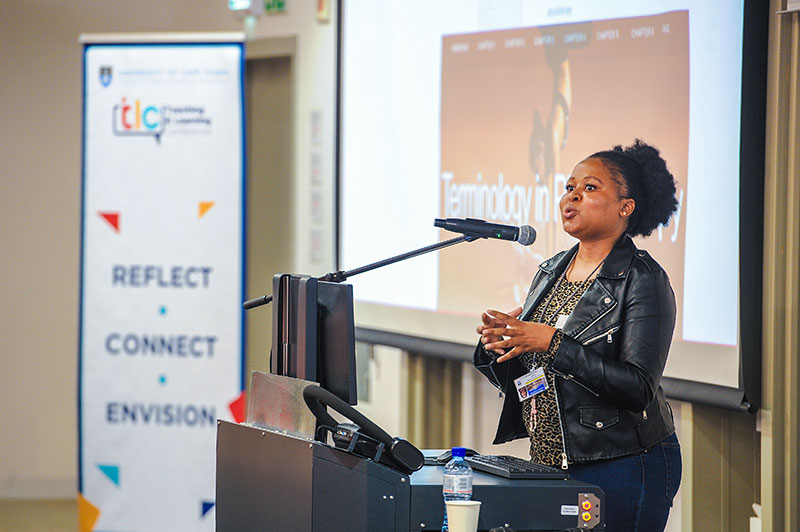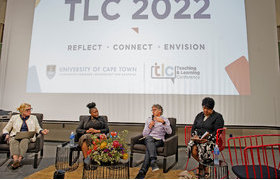UCT’s Open Textbook awardee had students at heart when devising book
30 November 2023 | Story Kamva Somdyala. Photos Lerato Maduna. Read time 4 min.
Nomusa Ntinga, a physiotherapy lecturer in the Faculty of Health Sciences, has been awarded the University of Cape Town’s (UCT) Open Textbook Award for 2023 for her interactive e-book, Terminology in Physiotherapy at this year’sTeaching and Learning Conference (TLC).
The annual conference, organised by the Centre for Higher Education Development (CHED), was abuzz with insightful discussions, innovative workshops, and transformative ideas at the forefront of educational assessment. This year’s gathering was under the theme, “Assessment Entangled: Rethinking for Excellence, Transformation, and Sustainability”.
Ntinga’s award aims to support innovative open education activity that addresses issues related to the cost of teaching and learning materials, as well as curriculum change and multilingualism at UCT.
“It’s an honour to receive this award. I’m humbled,” Ntinga, who started teaching at UCT in 2019, said as she accepted her award from acting Deputy Vice-Chancellor (DVC) for Teaching and Learning Professor Linda Ronnie

“Why the book? When I arrived at UCT, I remember my first experience of teaching: my students kept asking what terms meant and it was mostly students who look like me. So, I would explain it to them. One time as a student was exiting the lecture hall, I proposed that she translate the words into her indigenous language.
She leaned in and said, ‘Ma’am are you saying I must think in isiZulu?’ and the fact that she leaned in so that other students wouldn’t hear her is what struck me: our indigenous students are caught between two cultures. They are trying to embody what we are trying to teach them, but they are torn, and that violence is what I was trying to address with the book,” Ntinga explained.
The e-book has the terms under the course headings embedded in the physiotherapy (PT) curriculum for the first year of study and is arranged sequentially according to the first year of study separated into modules as they appear in the PT curriculum.
Embodying language
Michelle Willmers, the publishing and implementation manager of the Digital Open Textbooks for Development (DOT4D) project, said that they use a rigorous rubric to determine recipients.
“We look for curriculum transformation and decolonisation; pedagogical innovation; inclusion of students and marginalised voices; disability access; relevance to local context; multilingualism and technical innovation.”
“The interactive component allowed them to speak in their indigenous language.”
The award, now in its fourth year, was shared between Professor Johan Fagan and Dr Michael Held in 2020. In 2021, the award was won by Associate Professor Maria Keet. In 2022, the award was shared by Carol Hlela, Lehlohonolo Ntlatlapo, Rannakoe Lehloenya, Christine Ile, Pragna Rugunanan and Nomkhosi Xulu-Gama.
“When I first started, it was published on our learning platform and had to be interactive in nature because I wanted them to do the work of thinking and embodying the language of the course. The interactive component allowed them to speak in their indigenous language,” Ntinga said.
“UCT pulls in a lot of students from Mpumalanga, Johannesburg, and rural parts of KwaZulu-Natal, Limpopo and Venda and their indigenous language is part of their identity, so the fact that they must leave it outside the classroom is not a nice feeling.
“We’ve also revised the book, with student input to gauge what interests them, how many used the book and so forth. Physiotherapy is very technical and there is a lot you can do by way of introducing indigenous languages to soften the blow.”
 This work is licensed under a Creative Commons Attribution-NoDerivatives 4.0 International License.
This work is licensed under a Creative Commons Attribution-NoDerivatives 4.0 International License.
Please view the republishing articles page for more information.










